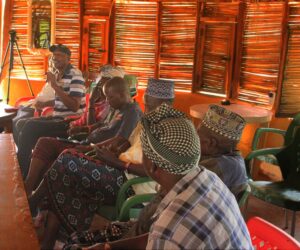During a recent field visit to Kalacha, PASEP facilitated a series of community engagements and stakeholder meetings aimed at advancing the conservation and sustainable use of the doum palm tree—a vital livelihood resource for pastoralist communities in Northern Kenya.
Youth Dialogue and Awareness Forum
PASEP convened a focused session with local youth leaders and community mobilizers to raise awareness on the importance of doum palm conservation and its untapped potential in creating green livelihoods. Participants discussed how overharvesting and land degradation threaten this indigenous tree and brainstormed community-driven strategies for replanting and value addition.

Caption: Kalacha youth engaged in an indoor dialogue on environmental conservation and the future of the doum palm.
Community Gathering Under the Trees
An open-air dialogue brought together elders, women, and youth to reflect on traditional uses of the doum palm and the shifting climate challenges affecting its sustainability. Community members expressed their strong interest in seedling propagation, water harvesting, and the formation of cooperatives to support the local economy through eco-friendly practices.

Caption: Community members in Kalacha gathered under the trees for an open forum on doum palm use and climate resilience.
Stakeholder Planning Meeting
The visit concluded with a multi-stakeholder planning session inside the Kalacha Resource Centre. Participants included local administration representatives, women’s group leaders, youth representatives, and PASEP facilitators. The discussions focused on mapping out next steps for a proposed two-year initiative supported through donor partnerships, including the installation of water storage systems, nursery development, and market linkages for doum palm products.

Caption: A stakeholder consultation session inside Kalacha Resort Centre to shape upcoming project activities.
PASEP is committed to scaling up this initiative through collaborative resource mobilization and capacity-building efforts. We thank the Kalacha community for their vibrant participation and continued support toward ecological restoration and resilience building.
#DoumPalmConservation | #CommunityResilience | #PASEPKenya

The Acacia Tree – Our Friend in Northern Kenya’s Arid and Semi-Arid Lands (ASALs)
In the vast landscapes of Northern Kenya’s Arid and Semi-Arid Lands (ASALs), survival is a daily struggle. Here, the sun beats down relentlessly, the soil is often bare and rocky, and droughts can last not just for weeks but for months and even years. In these unforgiving conditions, much of the vegetation disappears. Yet, standing strong amidst the dryness is the acacia tree — a symbol of endurance, adaptation, and hope.
The acacia thrives where other plants wither. Its roots plunge deep into the ground, reaching hidden reserves of water that sustain it through the harshest dry spells. Its small leaves, designed to minimize water loss, enable it to endure scorching heat and desiccating winds. Even when the landscape seems lifeless, the acacia remains green and alive — a living reminder that resilience is possible in the desert.
A Lifeline for Pastoralist Communities
For the pastoralists of Northern Kenya, the acacia is far more than a tree. It is woven into every aspect of daily survival.
• Shade and Shelter: In the blistering heat, families and herds rest beneath its branches, finding comfort and protection. Makeshift pastoralist camps, both for people and their animals, are often established under the generous canopy of an acacia.
• Fodder for Livestock: During periods of drought, when pastures vanish, the pods of the acacia become lifelines. Goats, sheep, and camels feed on them, allowing herds — and by extension their owners — to endure seasons of scarcity.
• Wood for Daily Life: Its wood is used to build temporary shelters, corrals for animals, and simple household structures. It also provides firewood — fuel for cooking and warmth during cold desert nights.
• Soil Protection and Regeneration: The acacia is nature’s engineer. Its roots stabilize fragile soils, reducing erosion from wind and flash floods. When the rains eventually return, these trees enrich the soil, allowing grass and shrubs to regenerate — thus reviving grazing lands.
Cultural and Spiritual Connection
Beyond its physical uses, the acacia holds a profound cultural significance for pastoralists. It features in songs, proverbs, and oral histories that describe endurance and protection. Under its shade, community meetings are held, disputes are resolved, and elders pass wisdom to the young. For many pastoralist families, life journeys — from birth ceremonies to livestock blessings — often unfold beneath an acacia tree.
In this sense, the acacia is not only a practical resource but also a spiritual companion, a silent witness to the struggles and resilience of generations of pastoralists.
Threats to the Acacia
Despite its strength, the acacia faces growing threats. Over-harvesting for charcoal and firewood, combined with the pressures of climate change, has reduced tree cover in many areas. The disappearance of the acacia means more than the loss of a tree — it is the loss of shade, fodder, fertile soils, and an anchor of cultural life. Without it, pastoralist livelihoods become even more fragile in the face of recurring droughts.
PASEP-Africa’s Commitment
PASEP-Africa recognizes the acacia as a foundation of resilience in Northern Kenya. Our mission is to protect, restore, and sustain this tree, ensuring it continues to serve both nature and communities. We are committed to:
• Community Mobilization and Reforestation: Supporting herders, women, and youth groups to establish nurseries, plant seedlings, and nurture them to maturity.
• Awareness and Education: Teaching communities and schools about the ecological and cultural value of the acacia, strengthening conservation from one generation to the next.
• Sustainable Energy Alternatives: Promoting improved cookstoves and solar energy to reduce pressure on tree cutting for firewood and charcoal.
• Policy and Governance: Working with elders, local leaders, and policymakers to safeguard indigenous trees through strong by-laws and supportive national policies.
The Tree of Life
In the face of climate change and environmental degradation, the acacia remains a beacon of resilience. It is more than a tree — it is a protector, provider, and partner in survival. For pastoralists of Northern Kenya, the acacia is truly a Tree of Life: a living symbol of the endurance of both people and nature in some of the harshest environments on Earth.
By safeguarding the acacia, we safeguard the future of communities, livestock, and ecosystems across the ASALs.
